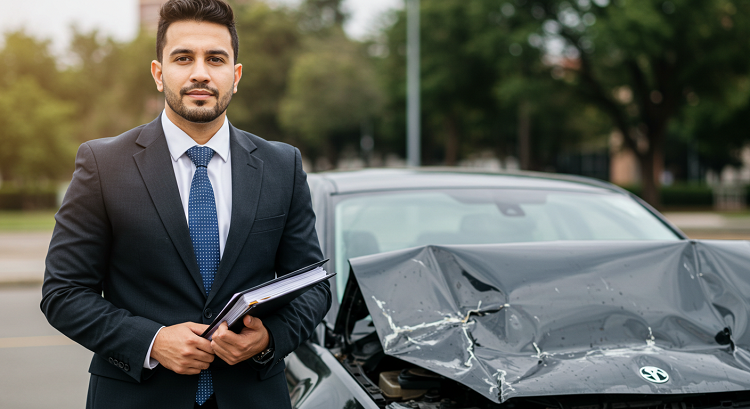Meeting with a car accident attorney is critical after a crash, especially when injuries, property damage, or insurance issues complicate the recovery process. Preparing for the initial consultation ensures the lawyer can evaluate your situation thoroughly and offer actionable guidance immediately. This preparation also saves time and avoids delays in pursuing your legal options.
When you speak with a car accident lawyer in Detroit, bringing specific documentation and details helps the attorney assess liability, calculate damages, and determine the best strategy for your claim. Incomplete or missing information can slow the process or result in missed compensation opportunities.
Table of Contents
Official Reports That Establish the Foundation
Bringing official documentation is essential for creating a factual account of the incident. Start with the following:
- Police report: Also called a traffic crash report, this document contains key facts about the accident, statements from involved parties, and the responding officer’s preliminary findings. It often includes diagrams and citations, which help clarify the fault.
- Medical records: Initial ER reports, ambulance records, discharge instructions, and follow-up treatment summaries provide evidence of injuries sustained and the seriousness of the impact.
- Crash scene photographs: If you took pictures of vehicle damage, road conditions, injuries, or debris, these images help illustrate the extent of damage and contribute to liability determinations.
When you speak with a car accident lawyer in Detroit, these reports give your attorney a clearer view of how the crash occurred and how it has affected you physically and financially.
Insurance Information: Policies and Correspondence
Attorneys need to understand the insurance coverage involved before evaluating potential recovery. Bring the following documents to your consultation:
- Your auto insurance policy: Include declarations pages showing coverage types and limits (e.g., PIP, bodily injury, uninsured/underinsured motorist).
- Letters or emails from insurers: Share all correspondence from your insurer and the other driver’s insurance company, including claim numbers, adjuster contact information, or settlement offers.
- Medical insurance details: If your health insurer paid for any treatments, they might have a right to reimbursement from the settlement. Your attorney needs this information to anticipate subrogation claims.
Insurance is significant in case valuation and recovery logistics, especially under Michigan’s no-fault rules. A thorough review helps your lawyer understand where payment responsibility falls.
Medical Expenses and Wage Loss Documentation
Injury claims often include both direct medical costs and indirect economic losses. Supporting documentation ensures that your damages are accurately calculated. Key items include:
- Receipts and invoices: Bring proof of out-of-pocket payments for treatment, prescriptions, therapy, or assistive devices.
- Health provider bills: Even unpaid invoices help document total medical expenses incurred.
- Pay stubs or income statements: If the accident prevented you from working, bring recent payroll records and a note from your employer outlining missed time.
- Disability forms: Include any physician-issued work restrictions or disability paperwork filed with your employer or insurance provider.
Estimating future damages or negotiating fair compensation becomes more difficult without this documentation.
Contact Information and Witness Details
Legal claims often hinge on supporting statements and corroborating evidence. Providing contact details can help attorneys build a stronger case. Include:
- Witness names and numbers: If anyone saw the crash or its aftermath, your attorney may want to interview them or secure a statement.
- Passenger or co-driver information: Fellow occupants can verify your actions during the crash and confirm injury severity.
- Medical providers: A list of doctors, specialists, or therapists you’ve seen since the accident allows your lawyer to request records efficiently.
Strong witness support can strengthen credibility and provide independent confirmation of your claims.
Personal Notes and Timeline
Don’t underestimate the value of your observations. Personal accounts offer insight into how the crash affected your day-to-day life. Useful materials include:
- Accident journal: A daily log of pain levels, emotional distress, mobility limitations, and sleep disruption gives context for pain and suffering claims.
- Written summary: Prepare a brief timeline of events—what led to the crash, how it happened, and what happened immediately afterward.
- Questions list: Include concerns about your claim, possible outcomes, or legal processes you don’t understand.
Well-prepared clients can help attorneys craft compelling, comprehensive arguments that resonate with adjusters, judges, or juries.
Photographic and Physical Evidence
Visual evidence can shape how claims are viewed and understood. Bring any images, diagrams, or objects that may help clarify the facts, such as:
- Vehicle photos: Capture different angles of the damage, including interior deployments (e.g., airbags).
- Injury photos: Images taken immediately after the crash and during recovery provide visual proof of trauma.
- Dashcam footage: If available, footage may show reckless driving, weather conditions, or the collision.
These visuals make claims more tangible and especially valuable when liability is disputed.
Legal and Financial Records
Depending on the circumstances, attorneys may need other legal documents to assess risk or prepare for litigation. These may include:
- Previous claims: Documentation from prior injury or accident cases may be relevant if the defense argues a pre-existing condition.
- Legal filings: If you’ve initiated a claim or received court documents, your attorney must review them to determine next steps.
- Lien notices: If third parties (like hospitals or Medicaid) assert a claim against your settlement, these must be addressed in advance.
Organizing this information avoids legal surprises and ensures your case proceeds efficiently.
Preparation Sets the Tone for Successful Legal Guidance
Arriving organized and informed allows your attorney to offer accurate advice and build a case strategy tailored to your needs. It also communicates that you’re serious about protecting your rights and pursuing fair compensation. The more relevant documentation you provide, the stronger your case begins.
Meeting with a car accident lawyer is more than a formality—it’s the first step in securing justice. A productive consultation depends on preparation, clarity, and transparency.

